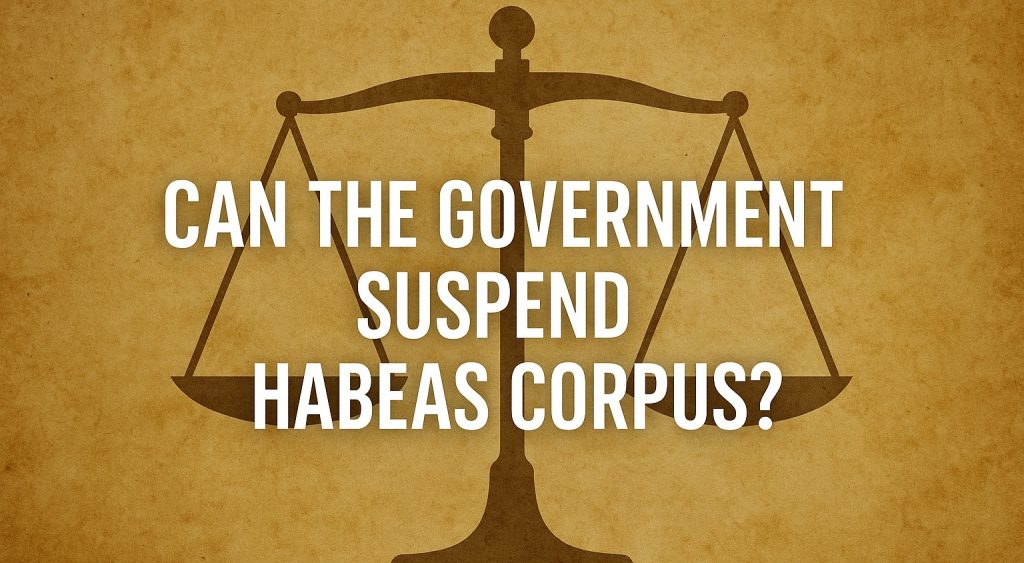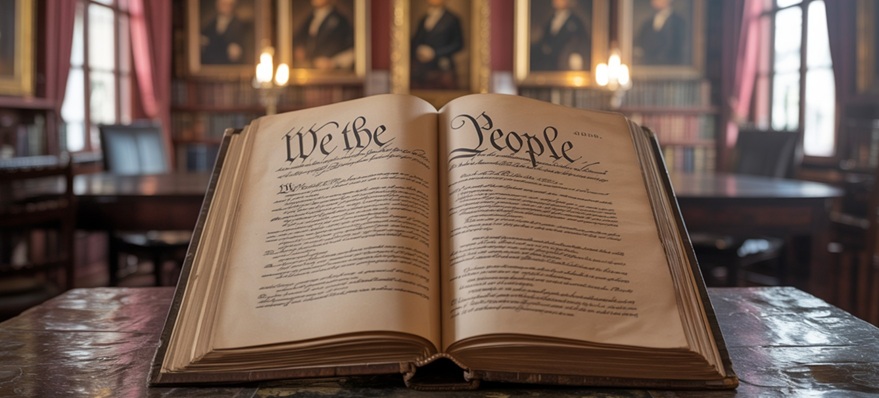What is Habeas Corpus in the U.S. Constitution?
Inside this Article
- What circumstances allow suspension of habeas corpus under the U.S. Constitution?
- How does habeas corpus protect individuals from unlawful imprisonment?
- How does habeas corpus remain relevant in modern times to protect individual rights?

Can the Government Suspend Habeas Corpus? Understanding Your Rights in a National Emergency.
Suspension of Habeas Corpus in the United States
Recent news discussions have raised public concern about the suspension of habeas corpus in the United States. Many people are asking: Can the government detain someone indefinitely without charges? What protections does the Constitution offer? Under what circumstances can those protections be taken away? This blog explains the constitutional right of habeas corpus, its historical significance, and when, if ever, the government can suspend it.
What Is Habeas Corpus in the U.S. Constitution?
Habeas corpus is a fundamental legal principle that protects individuals from being imprisoned without a lawful cause. It forces the government to justify a person’s detention in front of a judge. If the government cannot show legal grounds for holding the person, the court must order their release.
Article I, Section 9 of the United States Constitution says: “The Privilege of the Writ of Habeas Corpus shall not be suspended, unless when in Cases of Rebellion or Invasion the public Safety may require it.”
This language sets strict limits on when the government can suspend habeas corpus and who can authorize that suspension.
Why Habeas Corpus Matters in a Democracy
The writ of habeas corpus plays a key role in checking government power. It ensures that the executive branch, whether law enforcement, military, or national security agencies, cannot imprison people without following the law.
Without habeas corpus, the government could detain people secretly, without charges, access to a lawyer, or a fair hearing. The ability to demand a court review protects against political imprisonment, wrongful detention, and abuse of power.

When Can the Government Suspend Habeas Corpus?
Under the Constitution, the government can suspend habeas corpus only in two situations:
- Rebellion
- Invasion
Even in those situations, suspension is not automatic. The government must show that suspending the writ is necessary for public safety. Courts and legal scholars have debated whether other emergencies, such as terrorism or national unrest, qualify under this clause.
Historical examples of habeas suspension include:
- Civil War (1861): President Abraham Lincoln authorized the suspension of habeas corpus during the early days of the Civil War. Congress later passed legislation approving his actions. The Supreme Court, however, ruled in Ex parte Merryman that only Congress—not the President—has the authority to suspend habeas corpus.
- World War II (Japanese Internment): The U.S. detained over 100,000 Japanese Americans without criminal charges. While the courts did not formally address habeas corpus suspension, the episode remains a reminder of how constitutional rights can erode during wartime.
The rarity of these suspensions underscores how carefully courts and lawmakers must approach any attempt to curtail this constitutional protection.
Is Habeas Corpus Still Relevant in the United States Today?
Yes. In the modern era, habeas corpus remains essential for protecting civil liberties, especially during times of national stress or fear. Courts have addressed habeas petitions from individuals detained in military prisons, immigration custody, and terrorism-related cases. Some cities are considered “sanctuary cities” and purport to protect immigrants who fear being detained without due process.
Even in the context of national emergencies or security threats, the right to challenge unlawful detention serves as a legal safeguard. It ensures that the government cannot sidestep the Constitution.

Common Questions About Habeas Corpus and National Security
Can the president suspend habeas corpus on their own? No. The Constitution places the authority to suspend habeas corpus in the hands of Congress. Although some historical actions have blurred that line, courts have pushed back against unilateral executive power.
Does habeas corpus apply to citizens only? No. Courts have extended habeas protections to non-citizens in certain circumstances, especially when the person is in U.S. custody or under the control of the U.S. government.
What happens if the president suspends habeas corpus? If the writ is lawfully suspended, individuals may lose the ability to request a bond or challenge their detention in court. Suspending this vital constitutional right opens the door to indefinite detention without legal review.
Why should the public care about habeas corpus? The suspension of habeas corpus threatens personal freedom. In democratic societies, due process and the right to a fair hearing prevent government overreach. Without habeas corpus, those protections can disappear with little warning.

Habeas Corpus Protects Against Indefinite Detention in the United States
Habeas corpus stands as one of the oldest and strongest protections in American law. It prevents the government from imprisoning people in secret, without trial and legal review. The Constitution allows its suspension only in extreme circumstances—and only when public safety requires it.
Understanding this right becomes more important than ever in times of uncertainty or national tension. Discussions about suspending habeas corpus raise urgent questions about the limits of government power and the strength of constitutional protections.
Americans should remain informed and aware of how this legal safeguard operates. A functioning democracy depends on checks and balances, and habeas corpus plays a central role in that system.
Call us today at (248) 263-6800 for a free consultation or complete an online Request for Assistance Form. We will contact you promptly and find a way to help you.












